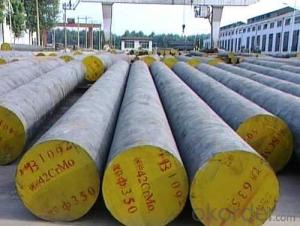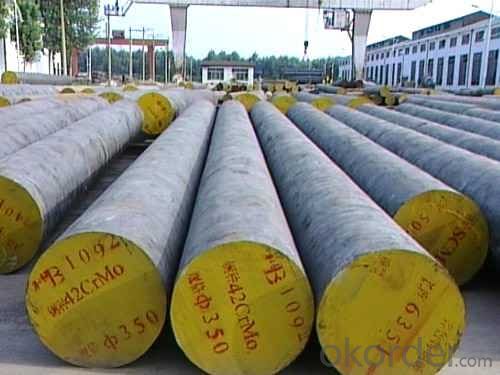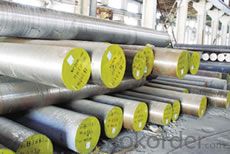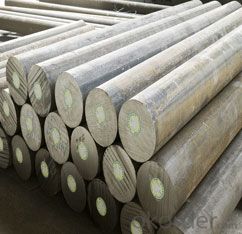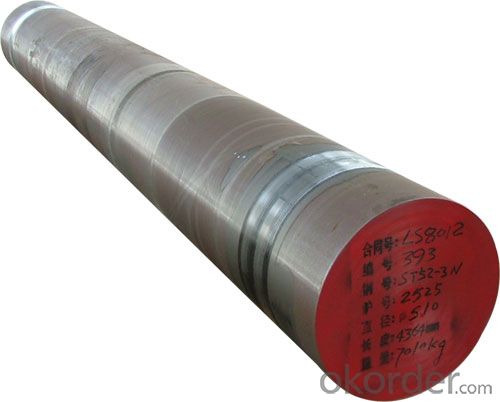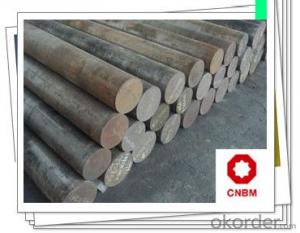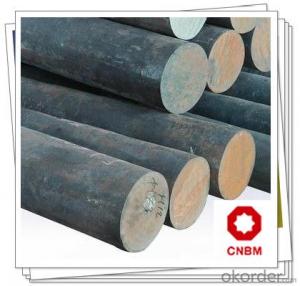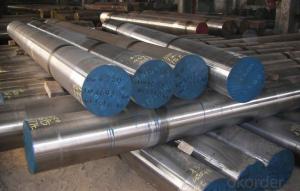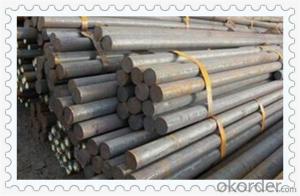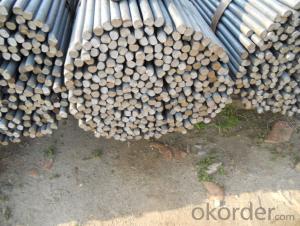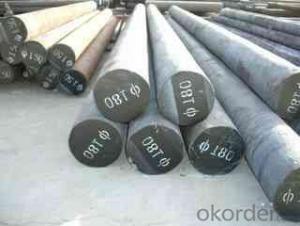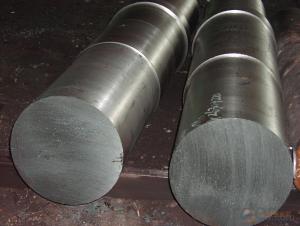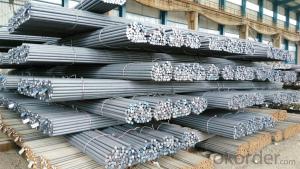alloy round steel bar 60*60 12M JIS STANDAR
- Loading Port:
- Tianjin
- Payment Terms:
- TT OR LC
- Min Order Qty:
- 100 m.t.
- Supply Capability:
- 100000 m.t./month
OKorder Service Pledge
OKorder Financial Service
You Might Also Like
Product Description:
Specifications of Common Steel Round Bar
1. Grade: 304, 316L, 321
2. Type: Mild carbon steel
3. Shape: Round bar, solid bar of steel with circular section
4. Diameter: 8mm-150mm
5. HS Code: 72283010
Usage and Applications of Common Steel Round Bar
1. Common Steel Round Bar of 8-25mm, or small round is mostly used for straight bundles supply, and used for steel, bolts and various mechanical parts. While the bigger round bar, or more than 25mm hot rolled bar, is mainly for the manufacture of mechanical parts or for seamless steel billet.
2. Steel round bar is used in construction and a large number of architectural and engineering structures.
3. Besides, we can supply some especial material steel round bar that can be used for main shaft of steamer, hummer shank, with big section and supper force.
Packaging & Delivery of Common Steel Round Bar
Packaging Detail: All goods are packed in bundle with steel strips and shipped by break bulk vessel or container (depend on target market and different ports)
Delivery Detail: 45 days
Trade terms: FOB, CFR, CIF
MOQ: 25 tons per specification; we can negotiate the quantity if the specification is normal or we have stock of one specification.
Weight: The price invoicing on theoretical weight basis or actual weight basis depends on customer’s request.
Shipment: The shipment of bulk break or container is depends on customer’s request and the situation of the port of destination.
Documents given: Full set of original clean on board bill of lading; Original signed commercial invoice; Original packing list; Policy of insurance; Certificate of origin and what the target market needs.
Production Flow of Common Steel Round Bar
We use advanced equipments like Electric Arc Furnace, Ladle Furnace and Vacuum Degasser to produce our products.
Material prepare (billet) — heat up — rough rolling — precision rolling — cooling — packing — storage and transportation
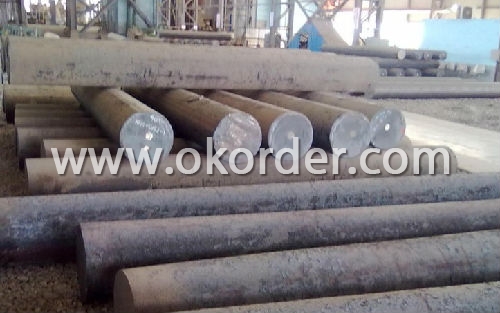
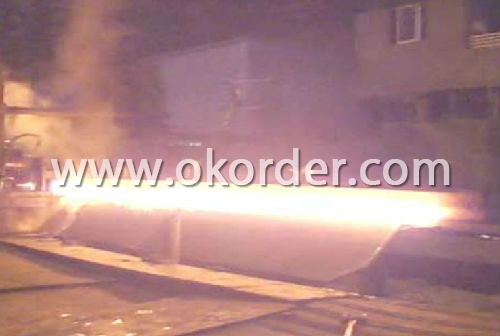
Characteristics of Common Steel Round Bar
1. The steel in which the main interstitial alloying constituent is carbon in the range of 0.12–2.0%.
2. As the carbon percentage content rises, steel has the ability to become harder and stronger through heat treating; however it becomes less ductile.
3. Quality should be in conformity with the specification of the manufacturer. Quantity and packing conditions should be in conformity with the term in the contract.
4. Regardless of the heat treatment, higher carbon content reduces weld ability. In carbon steels, the higher carbon content lowers the melting point.
- Q: What are the advantages of using mild steel round bars?
- There are several advantages of using mild steel round bars. Firstly, mild steel is a cost-effective material, making it an economical choice for various applications. Secondly, mild steel round bars have good weldability, making them easy to join and fabricate into different shapes and structures. Additionally, mild steel round bars offer excellent strength and durability, making them suitable for construction projects and other heavy-duty applications. Furthermore, mild steel has good resistance to corrosion, which enhances its longevity and reduces the need for maintenance. Lastly, mild steel is readily available and widely used, allowing for easy sourcing and compatibility with existing materials and equipment.
- Q: Can steel round bars be used for making agricultural equipment or machinery?
- Yes, steel round bars can be used for making agricultural equipment or machinery. Steel is a commonly used material in the construction of such equipment due to its high strength, durability, and resistance to wear and tear. Steel round bars can be used to manufacture components like axles, shafts, handles, and structural supports, providing the necessary strength and reliability required for agricultural applications.
- Q: What is the difference between a seamless and a turned steel round bar?
- A seamless steel round bar is produced by piercing a solid billet to create a hollow tube, which is then elongated and rolled to the desired size. This manufacturing method ensures a smooth and continuous surface, without any seams or welds. On the other hand, a turned steel round bar is a solid bar that undergoes machining operations to achieve the desired shape and dimensions. It is typically produced from a larger steel bar by removing material through turning or machining processes. Therefore, the main difference lies in the manufacturing process, with seamless round bars being hollow and formed through extrusion, while turned round bars are solid and shaped through machining operations.
- Q: Can steel round bars be used for making gears?
- Yes, steel round bars can be used for making gears. Steel round bars are commonly used in gear manufacturing due to their excellent strength, durability, and resistance to wear and tear. They can be machined, heat-treated, and shaped into various gear types, such as spur gears, helical gears, and bevel gears. Steel round bars offer high precision and reliability, making them suitable for applications requiring heavy-duty and high-performance gears, such as automotive transmissions, industrial machinery, and power transmission systems.
- Q: What are the different types of steel round bar alloys for improved toughness and wear resistance?
- There are several different types of steel round bar alloys that are specifically designed to offer improved toughness and wear resistance. These alloys are often used in applications where strength and durability are essential. Some of the commonly used alloys include: 1. Alloy Steel: Alloy steel round bars are made by adding different alloying elements such as chromium, nickel, molybdenum, or vanadium to enhance their mechanical properties. These alloys offer increased strength, toughness, and wear resistance. 2. Stainless Steel: Stainless steel round bars are corrosion-resistant alloys that contain a minimum of 10.5% chromium. They have excellent toughness, high strength, and superior wear resistance. Stainless steel round bars are widely used in industries such as aerospace, automotive, and construction. 3. Tool Steel: Tool steel round bars are specifically designed for applications where high wear resistance and toughness are crucial. These alloys are commonly used in the manufacturing of cutting tools, dies, and molds. Tool steel alloys often contain elements such as tungsten, vanadium, or molybdenum to improve their hardness and wear resistance. 4. Carbon Steel: Carbon steel round bars are widely used due to their high strength and toughness. These alloys contain varying amounts of carbon and are known for their excellent wear resistance. Carbon steel round bars find applications in industries such as manufacturing, construction, and automotive. 5. Bearing Steel: Bearing steel round bars are designed to withstand high stress and provide excellent wear resistance. These alloys are commonly used in the production of ball bearings, roller bearings, and other high-performance bearing components. Bearing steel alloys typically contain elements such as chromium, silicon, and manganese to enhance their mechanical properties. In conclusion, there are various types of steel round bar alloys available that offer improved toughness and wear resistance. The selection of the most suitable alloy depends on the specific application requirements and desired mechanical properties.
- Q: Can steel round bars be used in marine environments?
- Yes, steel round bars can be used in marine environments. However, it is important to choose the right type of steel that is specifically designed for marine applications. Stainless steel is the most commonly used type of steel in marine environments due to its corrosion-resistant properties. It contains a high percentage of chromium, which forms a protective oxide layer on the surface of the steel, preventing corrosion from saltwater and other harsh elements. Additionally, stainless steel round bars are known for their strength and durability, making them suitable for various marine applications such as shipbuilding, offshore structures, and marine equipment. Regular maintenance and proper care are also essential to ensure the longevity and performance of steel round bars in marine environments.
- Q: What are the different safety considerations when working with steel round bars?
- When working with steel round bars, there are several safety considerations to keep in mind. First and foremost, it is important to wear appropriate personal protective equipment (PPE) such as safety glasses, gloves, and steel-toed boots to protect against potential hazards. Additionally, one should always handle the steel bars with care to avoid injuries from sharp edges or heavy lifting. It is crucial to ensure a secure and stable work area to prevent slips, trips, and falls. Furthermore, when using tools or machinery to cut or shape the steel bars, proper training and caution should be exercised to prevent accidents and follow all recommended safety procedures.
- Q: What is the difference between a smooth and a precision ground steel round bar?
- A smooth steel round bar is a steel rod with a plain surface and no specific surface treatment or finishing process. It is typically made through hot rolling or cold drawing, resulting in a basic cylindrical shape with a relatively rough surface texture. Smooth steel round bars are commonly used in various applications where a smooth exterior finish is not crucial. On the other hand, a precision ground steel round bar goes through an extra manufacturing process to achieve a more precise and refined surface finish. The process involves removing any imperfections or irregularities from the steel rod's surface, resulting in a highly smooth and polished finish. This ensures that the round bar maintains a consistent diameter along its length and has a superior level of finish and accuracy. Precision ground steel round bars are widely used in applications that require tight tolerances, precision machining, or a smooth and polished surface. Industries such as aerospace, automotive, tooling, and manufacturing often rely on precision ground steel round bars for their high-quality surface finish, dimensional accuracy, and reliable performance. In conclusion, the main distinction between a smooth and a precision ground steel round bar lies in the surface finish and level of precision achieved. While a smooth steel round bar has a basic, rough surface texture and is suitable for general applications, a precision ground steel round bar undergoes additional grinding processes to achieve a highly smooth, polished, and accurate surface finish. This makes it ideal for applications requiring tight tolerances and precision machining.
- Q: What's the difference between Q345 round steel and No. 45 round steel material?
- Q345: it is a kind of manganese steel (16Mn), yielding strength of 345, good welding performance, commonly used in structural parts welding, low carbon steel, can not be used for quenching or quenching and tempering.No. 45 Steel: high quality carbon structural steel, medium carbon steel. Can be used for quenching or tempering.
- Q: Can steel round bars be used as axles or shafts?
- Yes, steel round bars can be used as axles or shafts. Steel is a commonly used material for axles and shafts due to its high strength and durability. Steel round bars are particularly suitable for applications requiring rotational motion, such as axles and shafts, as they can handle heavy loads and withstand bending and torsional forces. Additionally, steel round bars can be machined and heat-treated to meet specific requirements for hardness and surface finish, further enhancing their suitability as axles or shafts. Overall, steel round bars are a reliable and widely used choice for axles and shafts in various industries, including automotive, machinery, and construction.
Send your message to us
alloy round steel bar 60*60 12M JIS STANDAR
- Loading Port:
- Tianjin
- Payment Terms:
- TT OR LC
- Min Order Qty:
- 100 m.t.
- Supply Capability:
- 100000 m.t./month
OKorder Service Pledge
OKorder Financial Service
Similar products
Hot products
Hot Searches
Related keywords
